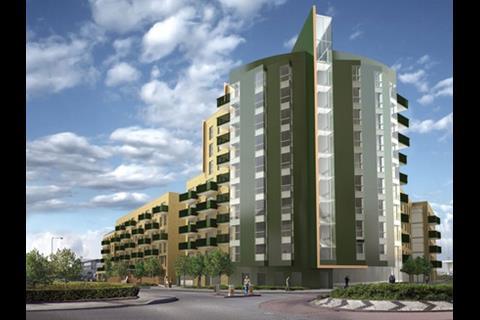UK-GBC proposal would see government-funded improvements repaid monthly by homeowners
Housebuilders could be spared from adding the extra cost of building zero-carbon homes on to sale prices, under a scheme being considered by the government.
The UK Green ║┌Â┤╔šă° Council (UK-GBC) has won the support of banks to set up a fund to cover the extra costs of efficiency improvements. Homebuyers would then repay this amount over 25 years. Under the arrangement, builders would not have to add the extra cost of achieving high code levels on to the sale price of new builds, making the homes easier to sell.
John Slaughter, director of external affairs at the Home Builders Federation, who led input from housebuilders into the plan, said: ÔÇťItÔÇÖs about preventing the upfront capital costs being a barrier to delivery.ÔÇŁ
The proposal is contained in a government-funded report, submitted this week, that fleshes out the details of the Pay As You Save initiative from the UK-GBC.
The buyers of energy-efficient houses would receive bills from their local authorities along with their council tax. This would cover the costs of extra insulation or energy-generating equipment, as well as an interest payment of 6-6.5%. The proposals claim that the monthly amount would be less than the savings householders would make on energy bills. The repayment regime would stay with the property as a ÔÇťlocal land chargeÔÇŁ.
The plan, conceived by the UK-GBCÔÇÖs David Adams, is also designed to work in the same way in order to fund energy efficiency improvements to the UKÔÇÖs existing housing stock. The possibility was raised in a consultation on the Heat and Energy Saving Strategy earlier this year.
Several banks, including Schroders, RBS and the Co-op, helped flesh out the financial aspects of the scheme and are understood to be interested in investing in the government-backed fund. The refurbishment part could be worth £5bn a year. This would be enough to retrofit 500,000 homes or 4% of the housing stock a year, Adams says.
The government has set a target of making 400,000 homes energy efficient by 2015 and 7 million by 2020. It is set to consider the report over the coming weeks.
ÔÇśWeÔÇÖve now got answersÔÇÖ
Paul King on the Pay As You Save initiative
Surprise, surprise, people donÔÇÖt like forking out for a load of low-energy measures that they donÔÇÖt see the payback on for several years.
ThatÔÇÖs the barrier that Pay As You Save is designed to solve. You remove the upfront cost by attaching a charge to a property for 25 years. The householder saves money even after paying the charge because their energy use is much lower.
HasnÔÇÖt this idea been around for a while? Well, yes, but there were big questions to answer. How do you raise finance? Who bills the consumer? WeÔÇÖve now got answers. ItÔÇÖs not going to be easy, but the size of this market, the opportunities for our industry, and the huge potential to reduce emissions means weÔÇÖve got to get on as quickly as we can.
Paul King is chief executive of UK-GBC





























10 Readers' comments